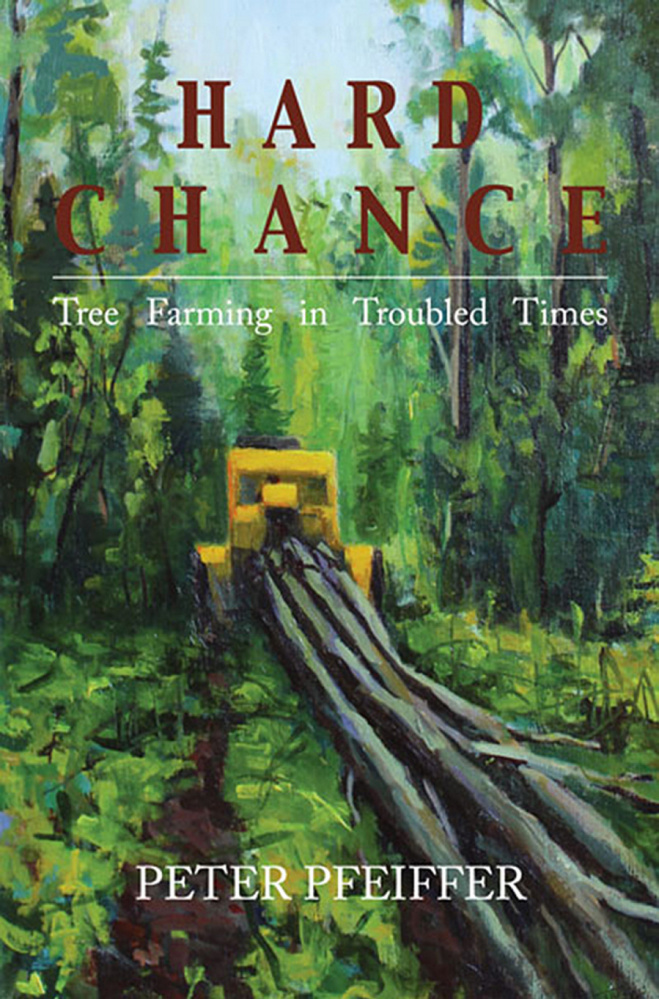Dana Wilde
“Hard Chance: Tree Farming in Troubled Times”
By Peter Pfeiffer; Maine Authors Publishing, Rockland, 2014
336 pages, paperback, $22.95
I’ve never been able to free myself of the suspicion that my chain saw is a wild animal. And so for 20 years I’ve been stumped about 1) what to do with my woods in Troy, and 2) why I could never find anyone who actually wanted to help with them.
Once an officious young woodsman walked my 9 acres with me, though you could tell it was largely because he had nothing better to do that day. In the end he told me the timber wasn’t worth much just then, but he’d cut down enough of my trees to make me 4 cords of stove-length firewood — for about $75 a cord more than the going cut-split-delivered price for someone else’s trees.
Now, thanks to the tree-farming chapters in Peter Pfeiffer’s “Hard Chance: Tree Farming in Troubled Times,” I have a better idea of what the answer to No. 1 might entail, and thanks to the troubled times chapters, I know the answer to No. 2.
The wood-cutting business is, overall, a “hard chance” in itself, Pfeiffer says. Specifically, in logging lingo, a “hard chance” involves “having to gather up eight to ten smaller trees to fill out a twitch” — a twitch being a haul of trees you “yank” out of the woods with your skidder. The opposite of a hard chance is a “good chance,” which refers to “nice, big wood.”
“In the logging life,” Pfeiffer observes, “there are usually more hard chances than good ones.” Leave the word “logging” out of this sentence, and you’re on the track of what this book is really about.
For it’s a collection of essays (plus play scripts) covering silviculture in the Maine woods and, moreover, how the author came to practice it.
His first brush with the deep woods occurred in 1960 when he was about 13 years old on a trip from his native Waterville to a canoeing expedition in the Allagash. He then maneuvered the idealistic and nomadic turbulences of the 1960s and ’70s, undertaking wayward and itinerant travels to Berkeley, Israel, Boston and the wild Southwest, to name a few places, and along the way became part of the back-to-the-land movement of the 1970s and ’80s. His story wends its way right into the economic-disaster 2000s and is still transpiring from his La-Z-Boy somewhere in the vicinity of Harmony village.
Early on, chapters vividly recalling events and characters in the author’s past are interspersed with fascinating standalone essays on silviculture in the Maine woods. After he gets settled into the woods life around West Athens, though, the silviculture material dissolves right into the story. Woods work became his life work.
Radiating in hilarious and thoughtful detail from this Earth-centered universe are story after story of harrowing logging expeditions; the workaday mortal dangers of taxi driving in Boston; the creepy subsurface insanity many of us experienced among living-room revolutionaries of the 1970s; the life, times and scripts of a community theater whose venue is a gravel pit; and portrait after dead-on portrait of Maine woods people, from the devious old Mainer who sold Pfeiffer his first wood lot, to a pot-smoking, drunken logging outfit that can’t get anything done (“Facts owe!”), to the do-it-yourself hippies from away who turned into community pillars.
While acting locally, Pfeiffer is consistently thinking globally, and he also provides a running, well-informed discussion of how world politics, economics and Big Paper have made their presence acutely and painfully felt over the past 50 years in outback Maine.
This book is both down-to-earth and provocatively literate, in several ways. It’s artfully well-written, with sharp, entertaining sentences and deft storytelling abilities applied to its rhetorical architectonics. Worked unpretentiously into the discursions are enlightening references to literature, principally “Moby Dick” and the mid-20th-century novel “The Man Without Qualities.” Who would have thought Robert Musil’s English-majors-only book could meaningfully inform a life in backwoods Maine?
For me, who didn’t risk his life mowing down trees with a chain saw but whose spruce-overhung shed of books undergoes constant management, it could be possible. But for the knock-down-drag-out life of a professional logger? And yet, from his off-the-grid homestead, Peter Pfeiffer lucidly pieced together what the facts owe the book, or the book owes the facts. Not sure which.
This is one of the best books about Maine I’ve read in a long time. I literally was sorry when it ended. You can get it through online booksellers and Maine Authors Publishing.
Off Radar takes note of books with Maine connections about twice a month in the Kennebec Journal and Morning Sentinel’s What’s Happening? Contact Dana Wilde at universe@dwildepress.net.
Send questions/comments to the editors.


